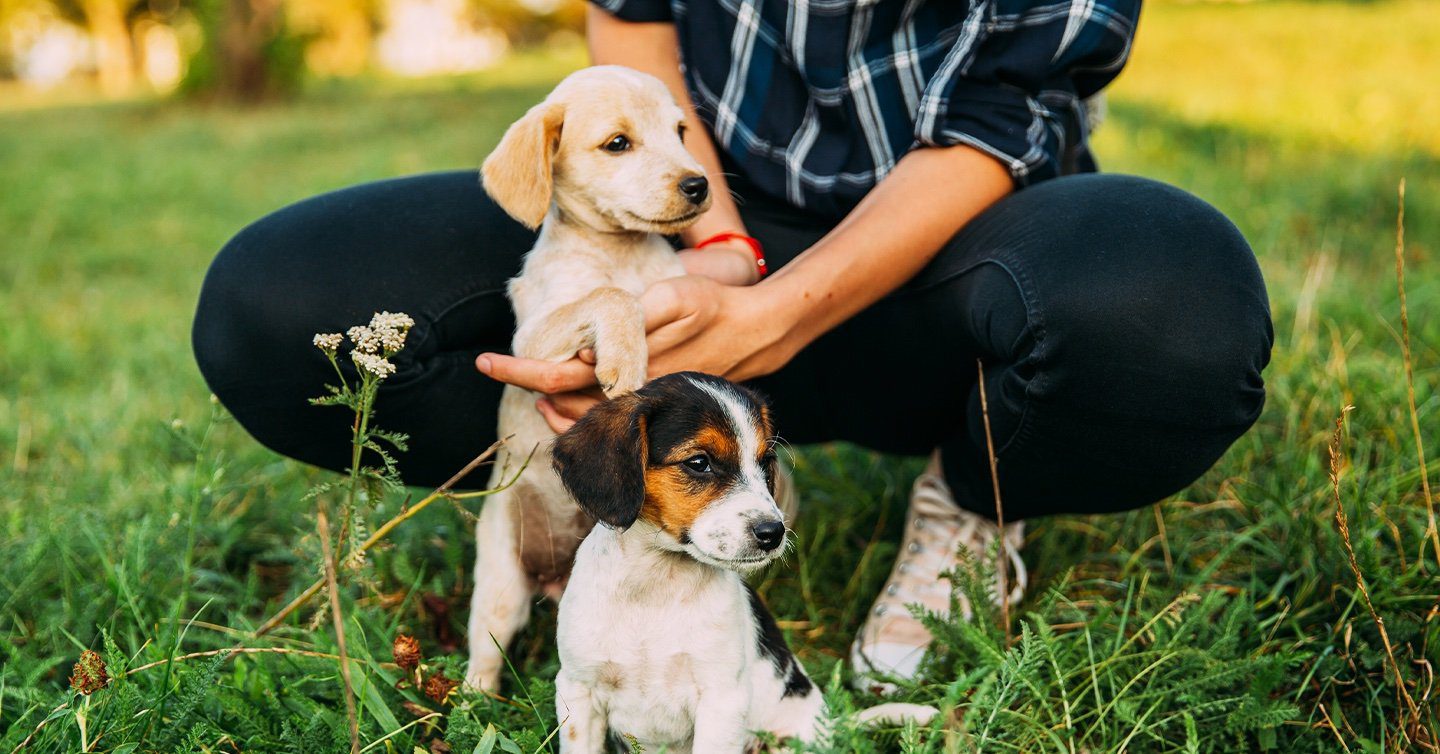Congratulations on your new puppy! This is an exciting time with plenty of playtime, snuggles, and potty-training mishaps ahead. But this is also a critical period of time in your puppy’s life – the coming days and weeks will be formative in how they build bonds, establish routines, and interact with their new world.
This period of time, also known as the puppy socialization period, is incredibly important. How pet owners help their puppy adjust to new people, places, and experiences early on will impact them for the rest of their lives.
In fact, research shows a dog’s brain is most capable of processing and accepting new experiences between three and 14 weeks of age. In other words, the earlier the better!
Without further ado, let’s jump into how puppy socialization works so you can help your new puppy become the confident, happy, well-behaved pup you know they can be.
What is puppy socialization?
Puppy socialization is teaching your puppy how to behave in new situations that will soon be their everyday life. Whether that means introducing them to a variety of people and pets or going for a car ride, you want to expose your puppy to positive experiences in their new world as soon as possible. Similar to how you’d teach a young child, you must teach your puppy how to navigate their new environment with the appropriate behavior. This way, you can prevent or minimize fear-based behaviors later on in their life.
Why is puppy socialization so important?
Proper puppy socialization sets a healthy precedent for the rest of a puppy’s life. Well-socialized puppies who’ve been exposed to other pets, people, and experiences are less likely to become anxious or scared in unfamiliar environments. Socialization not only helps your dog develop more confidence, but also minimizes anxiety levels when a new situation inevitably arises.
Puppies that aren’t properly socialized in youth may develop behavioral problems as older dogs, including aggressive behaviors such as biting and growling. Ever wonder why a dog is barking at nothing for hours at a time? Or why two dogs go after each other when they meet on the street? It could be the result of poor socialization.
Believe it or not, a well-socialized dog is also much healthier. According to the American Veterinary Society of Animal Behavior, the number one cause of death for dogs under three is behavioral issues, not infectious disease – a surprising statistic that proves just how vital early socialization can be.
What are some signs of a puppy who has not been properly socialized?
There are a few tell-tale signs of a puppy who has not been properly socialized. Some of these behaviors include:
- Growling
- Biting
- Excessive barking
- Reluctance to play or go outside
- Cowering in response to other people or dogs
- Shaking or stress in public places
- Aggressive or fearful behaviors
Tip: If you come across a dog displaying these behaviors, they are likely scared and/or stressed. Rather than yelling at the dog, stay calm and back away slowly.
Pet Pro Tip: New kitten owners often underestimate the long-term costs of veterinary care for a pet’s unexpected accidents & illnesses. Make sure you get your kitten insured as soon as possible!
When should I begin socializing my puppy?
From learning to pee on a training pad to adjusting to a new puppy feeding schedule, there is so much for your precious pooch to learn. We know it’s best to start training them young, but when is the ideal puppy socialization window?
Although socialization never stops, a puppy’s first three months of life are the most critical.
- Three weeks – Believe it or not, puppies may begin to acknowledge/approach people as early as three weeks old, so it’s important to handle them gently and safely from the start. If you’ve purchased your puppy from a knowledgeable breeder, they should foster this positive experience.
- Six to eight weeks – Puppies should remain with their mother and littermates until they’re about six to eight weeks old to ensure a healthy relationship with them. After this, they can be placed in a new home and adjust to new people, places, and experiences. It’s around this time that puppies hit peak sensitivity, making this a turning point for socialization.
- Eight to 12 weeks – Weeks eight to 12 are the home stretch of the most critical socialization window. Puppies’ fears begin to emerge at around eight weeks, so it’s important to have patience and help them overcome them.
- 12 weeks and beyond – Even the most socialized puppies need constant interaction reinforcement to prevent regression. Keep in mind that results can vary depending on your puppy’s breed and their unique disposition.
How do I begin socializing my puppy?
Training a young, rowdy puppy is not easy, but the good news is that they’re highly impressionable. Here are some ways you can start puppy socialization off on the right foot.
Reinforce positivity
Puppy socialization is all about introducing your puppy to new experiences. New sights, sounds, and smells can be intimidating, but it’s important to reinforce positive association and remind them that new things aren’t necessarily bad things. Be prepared with treats, praise, and positive reinforcement so your puppy learns to enjoy new experiences and familiarize themself with new environments easily.
Introduce different sensory experiences
A well-socialized puppy is comfortable with stimuli. Whether it be the sight of a stroller, the sound of the vacuum cleaner, or the smell of mulch, it’s a good idea to introduce them to sensory experiences that fall outside of their norm once they have a sense of home. If your puppy is only used to the sights, sounds, and smells of of your apartment for example, they are less likely to adjust well to new places. Don’t miss an opportunity to expose them to new sensory experiences while they’re young!
Ease in to new experiences
Many pet owners are eager to begin the puppy socialization process, and as a result, they tire out their young puppies with too much too fast. While it’s great to have this level of enthusiasm, you should always ease into new experiences. Puppyhood is a sensitive period in a dog’s life – they’re still growing and need lots of sleep. Rather than rushing them to the dog park or beach for hours, it’s best to opt for shorter visits to dog-friendly places.
Set up puppy playdates
While you want your puppy to get along with every dog they meet, taking them to the dog park on their first try is not a good idea. Not only is it extremely overwhelming for your puppy to meet multiple dogs at once, but there’s no telling how they may react. You don’t want to risk a bad first impression and trigger a fearful response in the future. Take it slow by introducing your puppy to a dog you know is friendly, in a comfortable space where you can mediate the meeting.
Enroll in a puppy class
While there’s plenty you can do on your own, it’s never a bad idea to seek out professional guidance for puppy socialization – especially if you’re a new pet parent. Consider taking socialization classes or training classes where dog trainers and behaviorists can work with your new puppy in a structured environment. Before attending a class, just make sure your pup has all of their vaccinations to ensure they’re protected.
Bottom line: Puppy training and socialization will not only help your puppy develop into a socially mature and confident adult dog, but also put your mind at ease. We hope these tips help you jumpstart the socialization process with your new furry bundle of joy.
Pumpkin can help cover eligible vet bills for behavioral issues with no sneaky charge. Protect your puppy from future ruh-roh’s with one of Pumpkin’s puppy insurance plans today.
*Pumpkin Pet Insurance policies do not cover pre-existing conditions. Waiting periods, annual deductible, co-insurance, benefit limits and exclusions may apply. For full terms, visit pumpkin.care/insurancepolicy. Products, discounts, and rates may vary and are subject to change.Pumpkin Insurance Services Inc. (Pumpkin) is a licensed insurance agency, not an insurer. Insurance is underwritten by United States Fire Insurance Company, a Crum & Forster Company and produced by Pumpkin. Pumpkin receives compensation based on the premiums for the insurance policies it sells. For more details visit pumpkin.care/underwriting-information.*




